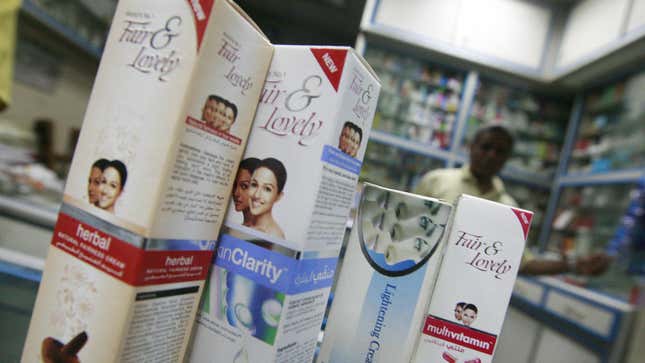
Skin lightening creams like Fair and Lovely have been on the market for decades, pushing bleaching and skin-whitening agents to women who live in societies where lighter skin is prized. For editor Kinita Shenoy, promoting these brands’ products in the pages of Cosmopolitan, where she worked, or on her own personal social media, was a non-negotiable part of her job. When she pushed back, Unilever, the consumer product giant that owns brands like Pond’s, wasn’t thrilled.
As Buzzfeed reports, Shenoy posted a thank you to the brand on Cosmopolitan’s Instagram story, fulfilling the unspoken contract between a brand and the editors it relies on to promote its products. But Shenoy also posted about the skin-lightening products on her personal Instagram story. “Aren’t we past the point where we tell wonderful, melanin-popping Asian women they need to make their skin look whiter?” she wrote. Shenoy’s caught the eye of Unilever executives, who contacted the publisher demanding that Shenoy be fired or that the magazine run two pages every six months promoting their skin lightening products. Shenoy refused to cave, and Unilever retaliated by pulling all advertising from the magazine for six months. It was only after Shenoy hired a lawyer and got the CEO of Unilever involved that the brand started advertising in the magazine again.
This incident is one of many others detailed in Buzzfeed’s report, which investigates the unusual control skin lighting brands attempt to exert over the influencers and editors who help them advertise in South Asia. Ornella Gunesekere, the winner of Miss Universe Sri Lanka in 2018, refused to endorse Facia, another skin-lightening brand, after sitting through a presentation by one of the brand’s representatives that included the use of the n-word and the assertion that “dark skin is ugly” and that to win Miss Universe, you must be white. Gunesekere was supposed to appear in a TV commercial to promote the products but eventually walked off the shoot. Facia, which was a sponsor of the Miss Universe Sri Lanka pageant, pulled out and has not advertised with them since.
Sadly, though, this is nothing new. Skin lightening creams are a byproduct of colonialism, lingering in spaces where white people existed as the ruling class for centuries. Change in this industry is particularly glacial; in response to the Black Lives Matter movement and increasing outside pressure, Unilever announced that they would remove language about “brightening” and “lightening” on some of their products—a small but necessary step that might just be lip service but could be the start of some real change.
Read the full story at Buzzfeed.